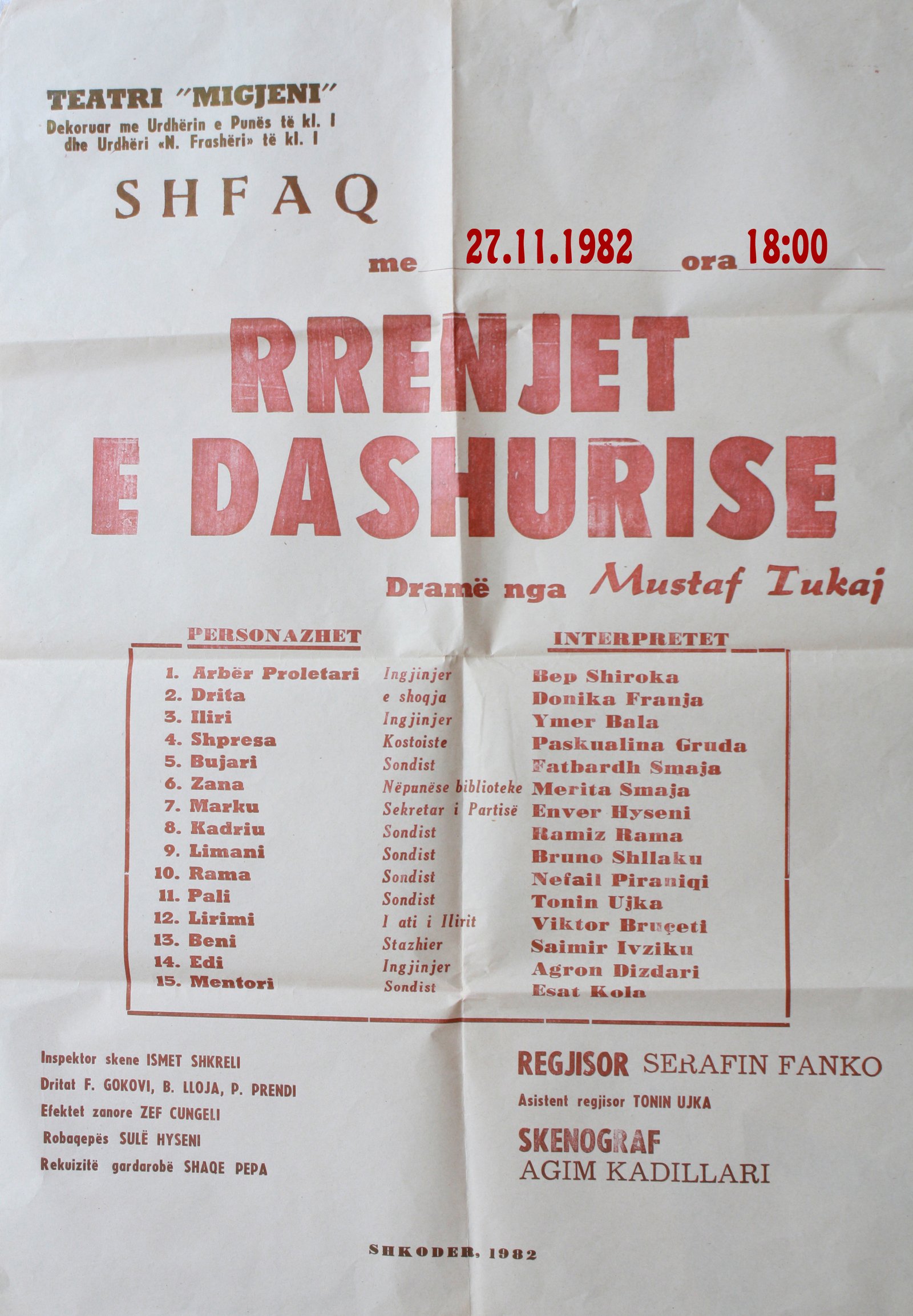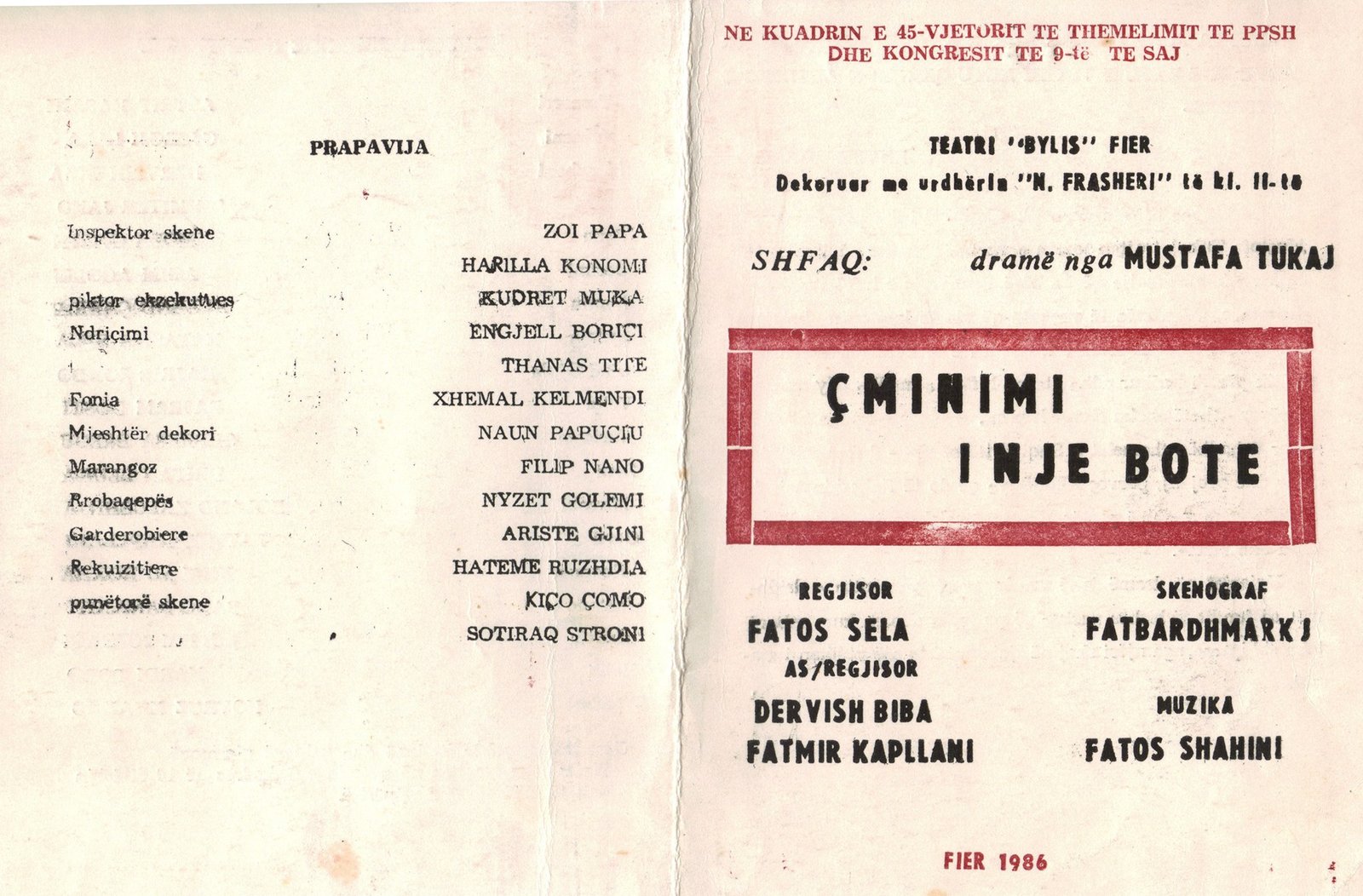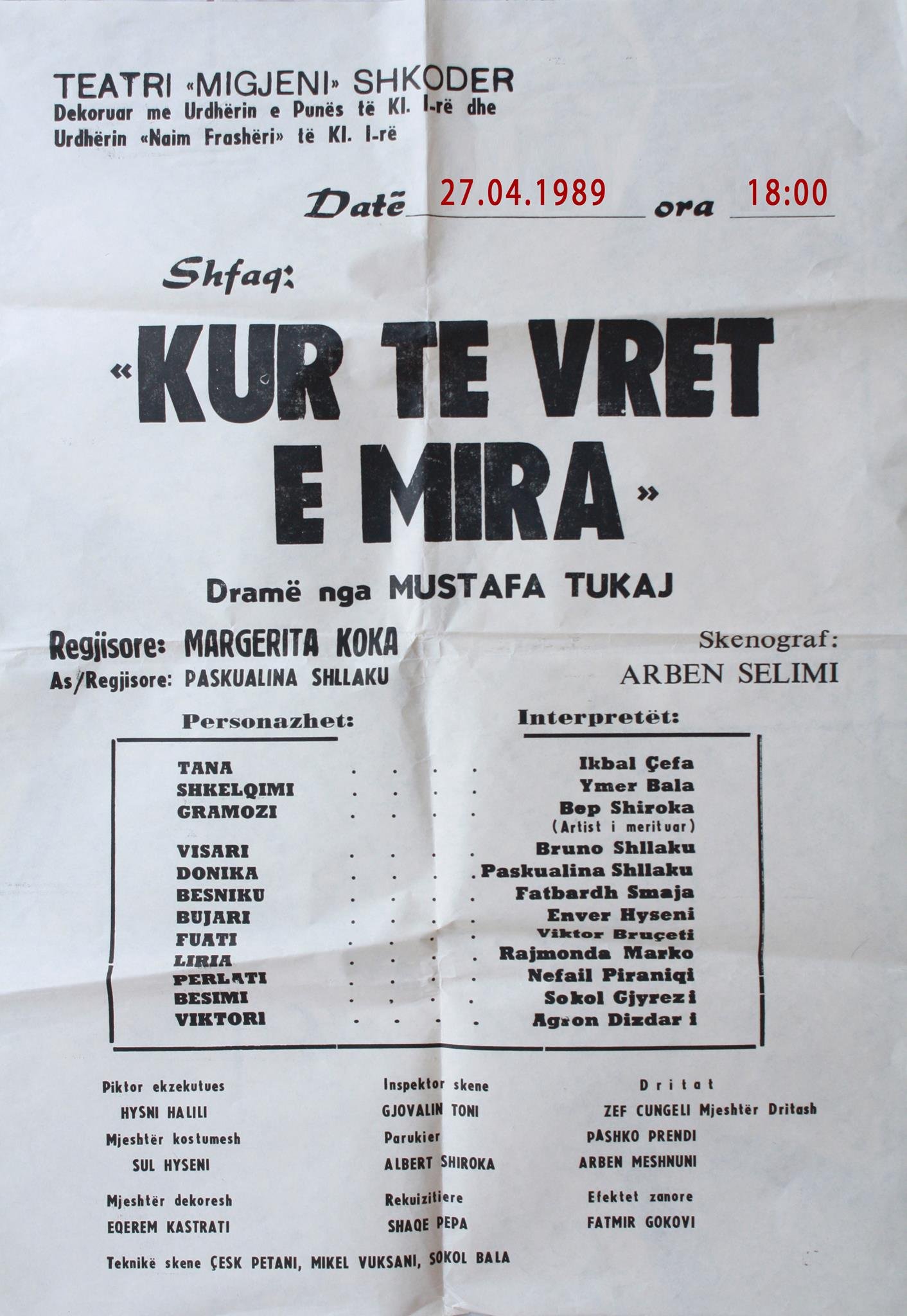
THE ROOTS OF LOVE
1982. Theatre “Migjeni” Shkodër.
Directed by : Serafin Fanko
The drama- events take place in the construction site of one of the biggest hydropower stations in the country, where a lot of difficulties and many problems had to be overcome and resolved.
The drama is full of vivid descriptions and interesting scenes of the life in that common, social and cultural milieu and through varied situations we come to know the main characters in their progress. The drama clearly underlines the courageous idea for the time when the play was written (under the communist dictatorship): a man mustn’t be valued or rewarded only by his family background or his parents’ merits, but by his own moral quality, his behaviour, his work and his contribution to the society.

THE OUTLAWS
1983. Theatre “Migjeni” Shkodër.
Directed by: Violeta Sekuj
It is a play based on the historical subject of early days of the twentieth century, when the
Albanian people struggled to gain the independence from the Ottoman Empire. Through dramatic
events and situations one come to know the main representatives of a band of freedom fighters, so-
called “the outlaws” - those strong, manly characters closely connected with each other and ready to
sacrifice their lives for the sake of their beloved fatherland.

SUCH AN END...
1984. Theatre “Petro Marko” Vlorë.
Directed by: Nazmi Bonjaku
1985. Theatre “Migjeni” Shkodër
Directed by: Elez Kadria
The drama, written as a real thriller, starts with a murder...A man was found dead in
his home. At first, it looks like a murder committed out of jealousy, but gradually, while maintaining
the suspense, the drama goes through unforeseen situations until it reveals the truth in its final
scenes. The drama highlights the important idea that those, who dared to fight against their own
people in the difficult moments of the war against Nazi -fascism and collaborated with the occupier
must be punished, even when they had thought their wickedness was forgotten...

THE MINED WORLD
1987. Theatre Fier.
Directed by: Fatos Sela.
The drama events took place in the last days of the German occupation. The people were
looking forward to the occupiers’ leaving, when suddenly rumours had it that the city was heavily
mined in many different places and that, before leaving, the Germans were going to blow it up. The
mining was carried out by Italian sappers, held as captives after the capitulation of the Italian army
and were forced by Nazis’ machine-gun barrels... Panic began to invade the city. The disaster had
knocked at the door... In such a dramatic situation, through increasingly interesting scenes, one sees
the main characters also discover the deeper recesses of their soul...

THE SHADOW OF THE GUILT
1987. Theatre “Migjeni”, Shkodër.
Directed by: Serafin Fanko,
As one of the most successful plays at the time when it was written, the drama appeared
with great success in almost all theater – stages of Albania. Besides its interesting plot, different
characters, artistic stage-performance or interpretation of prominent actors, there was another
reason for its success: the theme and the author’s courageous ideas spread to those years of
Dictatorship with sharp class struggle: A man can make mistakes in life and for that he might be
punished by the law. But, once the prison sentence imposed by the court has been served, he should
be treated in society as equal among equals and not be pursued for the rest of his life by the shadow
of his guilt...

WHEN THE GOODNESS KILLS...
1988 .Theatre “ Migjeni” Shkodër.
Directed by : Margerita Koka
A man may be talented and skilled in his profession. He may have a successful career and
even ascend to top-level positions. But he should not be vain and conceited; he should never forget
or disdain his close people, relatives, good friends and companions, with whom he has been for
years... It might happen that one day he might "come off the high horse” and fall in the “mud”.
Whom will he extend his hand for help in order to rise again? This is the main idea of the play,
which comes up through dramatic expounding of interesting events that are interwoven with scenes
sometimes lyrical and sweet.

ARTICLE 55
1991. Theatre “Migjeni” Shkodër.
Directed by : Fatbardh Smaja and Bruno Shllaku.
Only those who have lived in Albania during the years of communist dictatorship
understand the meaning of such barbarous clause, which sent immediately behind the bars for 15
years or more anybody who dared to express a free thought, somewhat outside the framework of the
principles of the dictatorial power.
The drama underlines the courageous idea for the time when it was written. Its numerous
characters are developed through dramatic scenes that become more and more interesting until the
end. The drama with its topics and main characters issues a clarion call to the society: Good people
beware of the punch of those powerful persons, who can destroy and trample you ruthlessly under
their feet, if ever anybody somehow violates their absolute power! Is not sometimes such an opinion
present even in countries that claim to be democratic?

THE GUESTS
The events of the play “The guests" take place nowadays, in one of the major Albanian cities. On a rainy afternoon, five people: a bearded man, a man in a bowler hat, another one in an expensive suit, a woman in her forties and an old man in a wheelchair, gather, coming one after the other, in one of the apartments of a multistory building. They do not know each other, but all of them have something in common: they had been invited by the same person, whom they do not know. After making some efforts to guess the reason of the call in an unfamiliar house by an unknown person, they learn that the invitation had come from the lady of the house. She explains that it was precisely her who had invited these five people and a young girl who had not arrived yet. She also explains that they were not called in vain there, but because there was a connection between them: their last supper in this world...

KILLED TWICE
Written 2017-2018 The drama elaborates on the post-war Kosovo theme in the late 1990s – and the beginning of 2000. Through an overly dramatic conflict, we know the characters of an Albanian family of Kosovo, whose members, especially the women, undoubtedly suffer the consequences of the monstrous crimes of Serbian nationalists...
